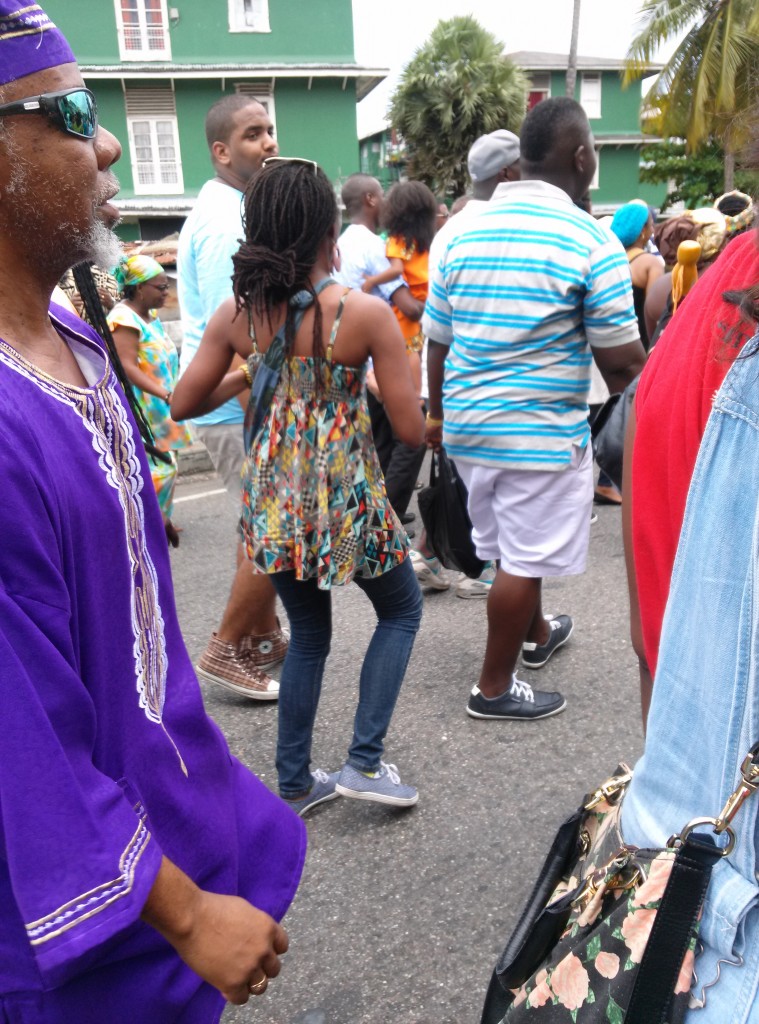At the Emancipation Day parade in Trinidad, something happened that I didn’t expect: Jesus showed up.

I couldn’t get a photo of this young woman’s face because she kept turning in circles as she danced. But this is a moment of her praise dance.
The truck we had been walking (and dancing) beside and around throughout the parade had been playing a mix of African and Caribbean music all day. Most of the artists I didn’t know and it was too loud for me to stop and ask someone, but I recognized Miriam Makeba, Fela Kuti, and the calypso, soca, and reggae beats of several songs. It was a soundtrack I wanted to take home with me. Then all of a sudden, the music switched, and a gospel song I had never heard before came on. It had a calypso beat, and people kept grooving with the music just as they had been doing all morning, so I don’t think I realized right away that gospel music was being played over those six jumbo speakers in the truck. But I did notice that the demeanor of some of the revelers was slightly different. Less winding, more holy dance. And then I found myself singing along with this song—
 When my heart is overwhelmed
Lead to the rock that is higher than I
–as if I knew its lyrics and notes by heart. I’ve since downloaded the song (“Hear My Cry, Oh Lord,†by Marvia Providence), and it is repetitive and easy to follow, but its lyrics also are direct passages from Psalm 61. The book of Psalms is, if nothing else, a book of music full of optimistic messages for believers, and that perhaps explains I saw one of the chaperones lock arms with her niece and praise as they walked, why I saw another student in our group tilt her head towards the sky and wave her hand, and why I found myself crying. (Tears are my praise dance. I don’t shout or run around the church.)
Silly, I know, given the prevalence of Christianity in Africa and the Caribbean, but I didn’t expect Jesus to be at the Emancipation Day parade. (I can feel a reader wanting to turn this into a sermon. Proceed if you wish, but just warning you, that’s not where I’m going with this.) It’s a day to celebrate freedom from oppression, and let’s just be honest: in the transatlantic slave trade, Christianity was the oppressor’s faith and often his justification for participating in such an immoral business (yeah, we’re selling people, but it’s cool; we’ll bring salvation to the savages!). Why honor that there?
Short answer: no matter how I feel about the means by which Christianity made its way across the Atlantic and throughout the African continent, it’s very much a part of who Black people everywhere, even Black people who don’t believe in it because  they think it’s a white man’s religion, are.
(I don’t have a longer answer yet, but I bring this up now for a few reasons. 1) I didn’t get around to blogging about this experience until now. 2) I’m taking the class “Religions of the African Diaspora,†and these questions about Christianity and Black identity will come up in the class. And 3) I want to explore those questions in writing a bit more. So just FYI, more is coming.)
